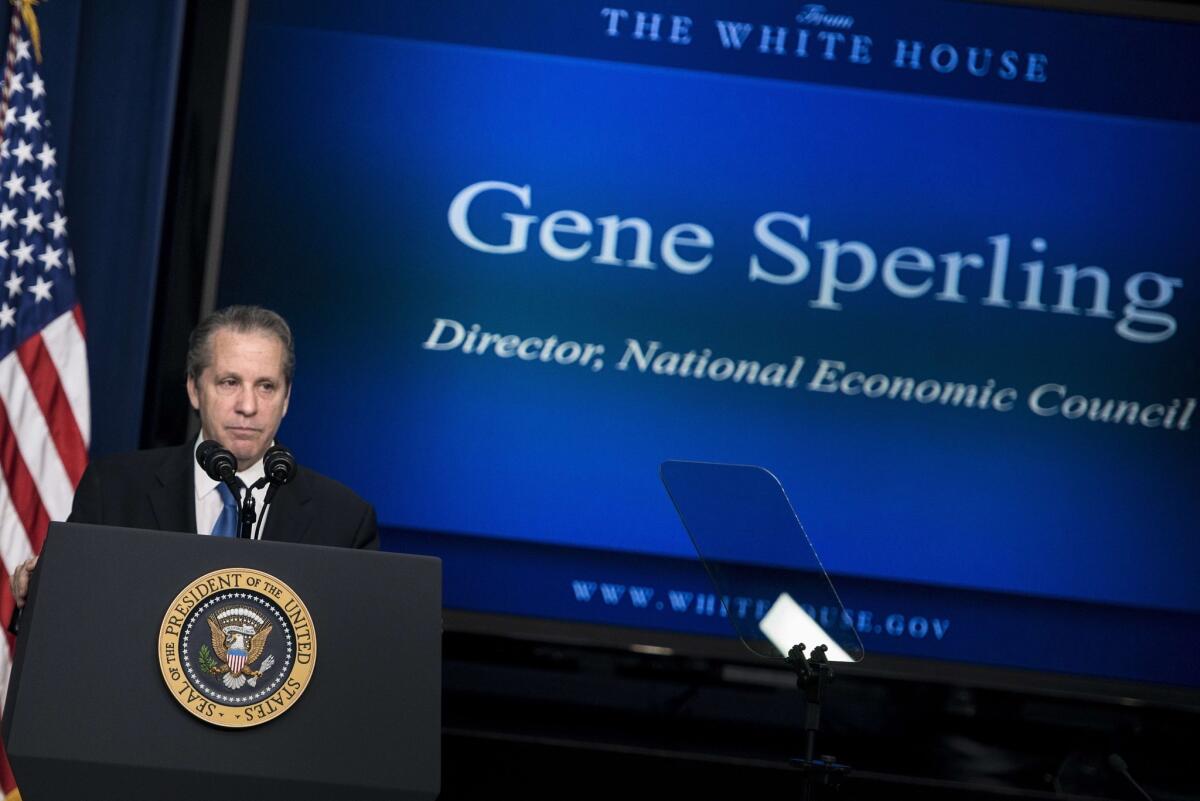Departing Obama economic advisor remains optimistic about recovery

- Share via
WASHINGTON -- Despite recent disappointing job growth, departing White House economic advisor Gene Sperling said Tuesday he remained hopeful the recovery is strengthening.
“I still think there is reason for optimism, though there’s unquestionably been some mixed data,” he told reporters at a breakfast hosted by the Christian Science Monitor.
Sperling, who has served as President Obama’s top economic adviser since January 2011, will leave his White House post next month.
PHOTOS: Federal Reserve chairs through the years
Just a few weeks ago, it looked as if he’d be departing with the economy on a sharp upswing. Economists were widely projecting an acceleration in growth this year.
But job creation has fallen off sharply, with 75,000 net new jobs added in December and 113,000 in January. Some other economic indicators, such as factory orders, have pointed toward a slowdown.
Sperling said the mixed data should be followed closely. But he said some of the information in the January jobs report released last week was more positive than the headline number.
He cited a slight increase in the labor force participation rate and strong growth in construction and manufacturing jobs.
“Overall, there’s reason for some optimism that the economy is continuing to strengthen, and time will tell which of the mixed results we saw are more accurate,” Sperling said as he prepares to step down as chairman of the White House’s National Economic Council.
Sperling said the automatic federal spending cuts known as the sequester had slowed job growth.
He predicted the unemployment rate would be below 6% if not for those cuts. The rate was 6.6% in January.
Sperling would not comment on reports Tuesday that House Speaker John Boehner (R-Ohio) had agreed to bring a bill up for a vote that would raise the debt limit with no conditions attached.
The nation technically hit its $17.3-trillion debt limit Saturday, and Treasury Secretary Jacob J. Lew said Congress must raise it by Feb. 27 or risk default.
The White House and congressional Republicans have battled over raising the debt limit during Sperling’s tenure. Sperling described those fights as “an annual drama” that has hurt economic confidence domestically and the reputation of the U.S. abroad.
“Our hope would be that we as a country have now reached a consensus that while we will continue to battle mightily on the budget ... that the tactic of threatening default or threatening the full faith and credit of the United States for budget debates is over, off the table and never to happen again,” Sperling said.
“And if so, I think that would be a boost for confidence and long-term investment in the United States,” he said.
More to Read
Inside the business of entertainment
The Wide Shot brings you news, analysis and insights on everything from streaming wars to production — and what it all means for the future.
You may occasionally receive promotional content from the Los Angeles Times.











